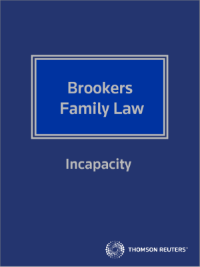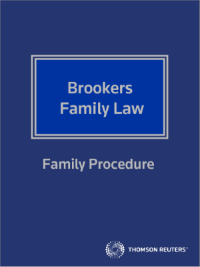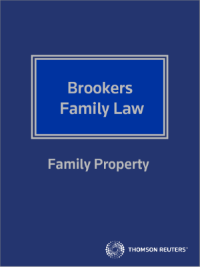Family Law - recent case commentary
Family Law — Incapacity: Mental Health (Compulsory Assessment and Treatment) Act 1992
Gordon v Attorney-General [2023] NZHC 2332 is an interesting case concerning the Mental Health (Compulsory Assessment and Treatment) Act 1992 with applicants unsuccessful in seeking declarations that a human rights-consistent interpretation and application must be applied to the definition of “mental disorder”; the meaning of “consent”; a child’s consent to treatment; a valid advance directive; and community treatment orders.
Author and general-editor of the Incapacity product, Iris Reuvecamp, writes:
"Her Honour found that, with respect to the first and second causes of action, the purpose of the MHCAT Act is sufficiently important, in and of itself, to justify the curtailment of the right to refuse medical treatment; that the limiting measure is rationally connected with the MHCAT Act’s purpose; and that the limiting measure impairs the right to refuse to undergo any medical treatment no more than is reasonably necessary for sufficient achievement of its purpose (at [176]–[181]). Further, the right to freedom from discrimination and the right not to be arbitrarily detailed, were not engaged (at [170]). Her Honour found that on the current definition of “mental disorder” under the MHCAT Act and the Court of Appeal’s decision in Waitemata Health v Attorney-General (2001) 21 FRNZ 216, [2001] NZFLR 1122 (CA), it was (at [103]):
'… not open or appropriate for this Court to redefine the definition of ‘mental disorder’ nor overlook how the risks of serious danger or harm to those with disordered thinking or perceptions arising out of an abnormal state of mind are to be balanced in a rights consistent way.'
Her Honour found that the Court would be acting outside its role in adopting the more human rights-consistent interpretation of the MHCAT Act, as sought by the applicants, and that the interpretation proposed was not available to the Court."
The decision is currently subject to an appeal to the Court of Appeal and is likely to be heard in 2024.

Family Law — Family Procedure: Evidence
Frustration is being expressed by the Court of Appeal over excessively long affidavits. We had Roberts v Cresswell [2023] NZCA 36 earlier this year, where author Dr Debra Wilson noted:
“In Roberts v Cresswell [2023] NZCA 36, the Court of Appeal sent a message to the lawyers for both sides, following affidavits that contained “significant portions of … inadmissible opinion evidence and comments in the nature of submissions” (at [111]). The Court stated:
'Solicitors should be astute to ensure that only admissible material is included in affidavits, especially where those affidavits are filed on appeal with the leave of this Court: only material that is genuinely relevant, admissible and squarely within the scope of the leave granted (or sought) should be included.'”
Now we have An v Feng [2023] NZFC 7210:
“A similar comment was made in An v Feng [2023] NZFC 7210 at [31], where Judge Muir noted:
'There has been a regrettable tendency by parties litigating in the Family Court to file bundles of documents or affidavits which contain many pages or exhibits which are not referred to anywhere in the evidence and which do not feature in cross examination or even in counsel’s submissions when the matter proceeds to a defended hearing. It is not a practice that is to be encouraged. It is a practice that breaches Rule 3 of the Family Court Rules and s 8 of the Evidence Act. There is a real risk that the inclusion of very lengthy documents which are not directly relevant will unfairly prejudice the proceeding and needlessly prolong it.'
The affidavit evidence in this case ran to over 600 pages, including Exhibit G, which was 258 pages long and its relevance was explained as containing a letter of support for the applicant. The respondent asked the Court to require the applicant to refile the affidavit and to specify the relevant parts. The applicant responded that the Family Court had no explicit statutory authority to require this. Judge Muir noted that r 15(1)(b) of the Family Court Rules 2002 permitted the Court to deal with a matter “in a way decided by the Judge, in light of the purpose of these rules, if the Judge considers the matter cannot be dealt with under provisions of these rules dealing with similar matters”. In addition, the Court had an inherent jurisdiction to regulate to act effectively in its own jurisdiction and that such an order could be made. In concluding (at [37]) that it is 'unhelpful and frustrating for a Family Court Judge and for opposing parties' to deal with such lengthy affidavits, Judge Muir required the applicant to list the relevant pages and paragraph numbers of evidence she is relying on.”

Family Law — Family Property: Law Reform (Testamentary Promises) Act 1949
In Chambers v New Zealand Guardian Trust Co Ltd [2023] NZHC 2084 the daughter and only child of a man who had died leaving the shares of his business in his will to his wife as part of the residual estate, made a testamentary promises claim and a constructive trust claim for the 40 per cent shareholding as he had told his daughter and others that this is what he had wished for her, and she had spent many years working for the business, improving its efficiency and receiving “well below the average for such work”.
Professor Emerita Nicola Peart writes:
“... the applicant succeeded in both her testamentary promises claim and her constructive trust claim … [w]hile her father underestimated the importance and value of paperwork and administration, independent evidence established that her work preserved and enhanced the business, ensuring compliance with health and safety requirements and managing the administration. She had also committed to his succession plan to keep the business within the family. It was his clear intention that his shares in the business would pass to her on his death, subject to providing some income to his widow, but he did not manage to put his plan into effect prior to his death. His daughter’s work and services and his stated intention that she receive his shares on death fulfilled the requirements for a testamentary promises claim and, in the alternative, a constructive trust. The Court gave effect to those findings by ordering that the shares vest in the applicant, subject to the widow receiving 10 per cent of the net annual income from the business for her life time.”
There’s plenty more to catch up on in the latest Family Law updates.

